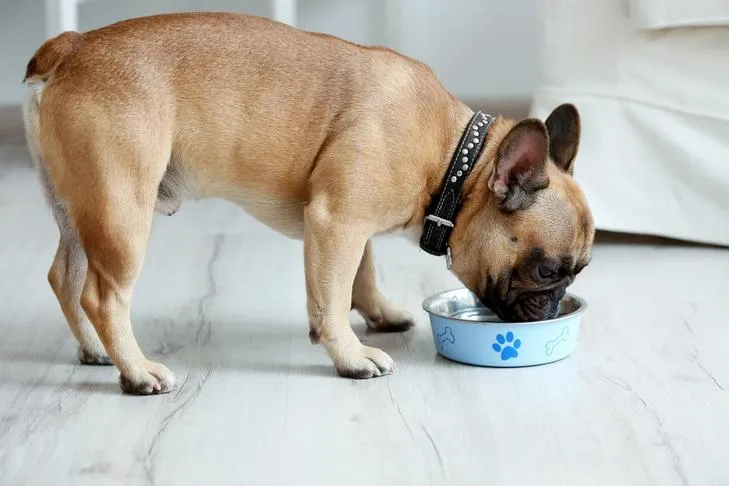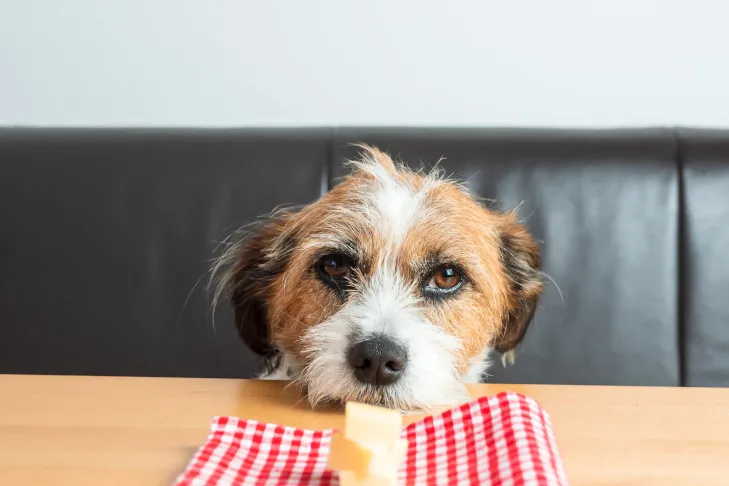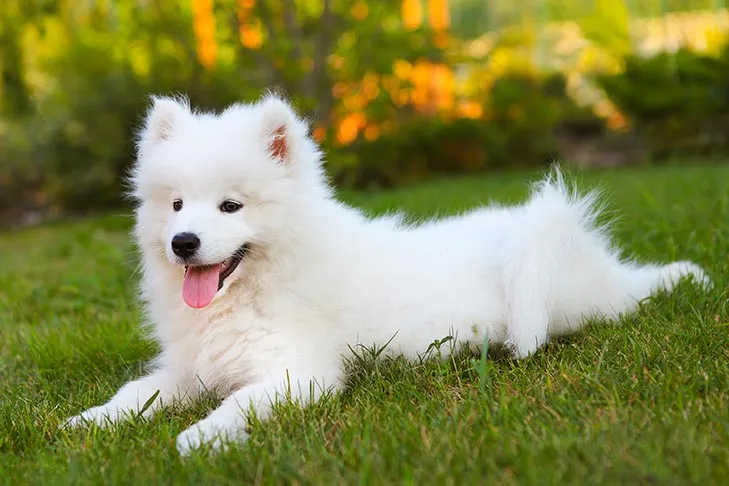Many dog owners find themselves wondering, “What People Food Can Dogs Have?” as they enjoy a meal, seeing their furry companion gaze up with pleading eyes. While commercial dog food provides a balanced diet, sharing small, safe human treats can be a wonderful way to bond with your pet and even offer additional nutritional benefits. However, it’s crucial to know which foods are safe and beneficial, and which can be harmful. This comprehensive guide from Dog Care Story will help you navigate the world of human foods for dogs, ensuring you provide only healthy and appropriate options for your beloved canine.
Before introducing any new food into your dog’s diet, always consult your veterinarian, especially if your dog has allergies, sensitivities, or pre-existing health conditions. Understanding what foods dogs can and can’t eat is key to responsible pet ownership, as even seemingly harmless items can pose risks if not prepared correctly or given in appropriate amounts.
Understanding Your Dog’s Dietary Needs
Dogs are omnivores, meaning their diet can consist of both plants and animal products. While their primary diet should be high-quality dog food formulated for their specific needs, certain human foods can safely supplement their meals or serve as healthy treats. The key is moderation, proper preparation, and awareness of potential risks. Foods should always be plain, unseasoned, and cooked appropriately. Avoid ingredients like onions, garlic, salt, sugar, and artificial sweeteners, all of which can be toxic or detrimental to canine health.
Safe & Healthy People Foods for Dogs
Here’s a detailed look at various human foods that are generally safe and can even be beneficial for your dog, along with important preparation tips and considerations.
Fruits & Vegetables
These natural treats offer vitamins, minerals, and fiber.
1. Apples: A great source of vitamins A and C, and fiber. Always remove the core and seeds, as apple seeds contain small amounts of cyanide. Cut apples into small, bite-sized pieces to prevent choking hazards.
2. Bananas: Rich in potassium, vitamins B6 and C. Due to their high sugar content, bananas should be given in very small amounts as an occasional treat.
3. Blueberries: Packed with antioxidants, fiber, and vitamins C and K. These tiny superfoods can boost your dog’s immune system and are great in moderation.
4. Carrots: Excellent for teeth cleaning and a good source of beta-carotene, which produces vitamin A. They are low in calories and a crunchy, satisfying snack. Both raw and cooked carrots are fine.
5. Green Beans: Full of vitamins K, C, and A, as well as fiber and manganese. Plain, cooked, or raw green beans are a healthy, low-calorie snack, perfect for dogs watching their weight.
6. Pumpkin: Plain, cooked pumpkin (not pumpkin pie filling) is a fantastic source of fiber and can help with both diarrhea and constipation. It’s rich in vitamin A and antioxidants.
7. Sweet Potatoes: A great source of dietary fiber, vitamin B6, vitamin C, and beta-carotene. Always serve cooked and peeled, as raw sweet potatoes can be hard to digest.
Grains & Carbohydrates
When prepared simply, some grains can be a good source of energy.
1. Bread: Small amounts of plain, unseasoned bread are generally harmless. However, it offers little nutritional value and is high in carbohydrates and calories. Avoid breads with raisins or artificial sweeteners. Homemade plain bread is a better option than store-bought, which often contains unnecessary preservatives.
2. Corn: A common ingredient in many dog foods, corn provides carbohydrates and fiber. It’s safe for dogs as long as it’s off the cob. The cob itself is indigestible and can cause intestinal blockages, which can be life-threatening.
3. Oats: Cooked oatmeal (plain, without sugar or flavorings) is a good source of fiber, vitamins, and minerals. It can be particularly soothing for dogs with sensitive stomachs.
4. Pasta: Plain, cooked pasta (without sauces, oil, or seasonings) is safe in small quantities. It’s primarily a source of carbohydrates and should be given sparingly.
5. Popcorn: Air-popped, unsalted, and unbuttered popcorn can be a fun treat in moderation. It contains riboflavin and thiamine. Ensure all kernels are fully popped to prevent choking hazards or dental issues.
6. Quinoa: This pseudograin is a complete protein source and rich in fiber. You can find quinoa in some high-quality dog foods, making it a healthy alternative to corn or wheat. Serve it cooked and plain.
7. Rice: Cooked white or brown rice is often recommended for dogs with an upset stomach due to its blandness and digestibility. It’s a good source of carbohydrates.
8. Wheat or Grains: Unless your dog has a diagnosed grain allergy, grains like wheat are perfectly fine and offer essential fatty acids, protein, and fiber. Always consult your vet if you suspect a grain sensitivity.
Proteins & Meats
Lean, cooked meats are excellent sources of protein for dogs.
1. Eggs: Fully cooked eggs are a fantastic source of protein, vitamins (A, D, E, B12), and fatty acids. They can help an upset stomach. Never feed raw egg whites, as they can lead to biotin deficiency over time.
2. Fish: Cooked fish, such as salmon and sardines, provides omega-3 fatty acids, which benefit joint, brain, and coat health. Salmon is loaded with vitamins and protein. Sardines have soft, digestible bones for extra calcium. Always ensure fish is fully cooked and all bones are meticulously removed (except for the tiny, soft bones in sardines). Limit fish intake to no more than twice a week.
3. Pork: Cooked, lean pork (without excessive fat, skin, or seasonings) is a highly digestible protein, packed with amino acids. It can be a good option for dogs with allergies to more common proteins like chicken. Avoid cured pork products like bacon or ham due to high sodium and fat content.
4. Shrimp: Cooked shrimp, with the shell, tail, head, and legs completely removed, is a low-calorie, low-fat source of antioxidants, vitamin B-12, and phosphorus. Offer in moderation.
5. Turkey: Cooked, plain, boneless, and skinless turkey is safe and a good source of protein. Ensure no excessive fat, skin, bones, or seasonings (especially onions or garlic) are present. Poultry bones can splinter, causing internal injuries.
6. Tuna: Cooked, fresh tuna in small amounts offers omega-3 fatty acids for heart and eye health. Canned tuna in water (not oil) is also acceptable occasionally, provided it’s plain and low in sodium. Excessive mercury and sodium intake should be avoided.
 A French Bulldog happily eating from its bowl at home, representing a well-fed and cared-for pet.
A French Bulldog happily eating from its bowl at home, representing a well-fed and cared-for pet.
Nuts & Seeds
These can be tricky; always choose plain, unsalted varieties and be mindful of choking hazards.
1. Cashews: Unsalted cashews are okay in very small quantities. They contain calcium, magnesium, antioxidants, and protein. However, their high-fat content means too many can lead to weight gain or pancreatitis.
2. Peanuts: Unlike almonds, plain, unsalted peanuts are safe for dogs and provide good fats and proteins. Offer in moderation to prevent excessive fat intake, which can cause pancreas issues. Ensure they are shelled.
3. Peanut Butter: An excellent source of protein, heart-healthy fats, vitamins B and E, and niacin. Always choose raw, unsalted peanut butter and critically check the label for xylitol, a sugar substitute that is highly toxic to dogs. Xylitol poisoning can be fatal.
Dairy Products
Dairy can be safe for some, but many dogs are lactose intolerant.
1. Cheese: Small to moderate amounts of low-fat cheese like cottage cheese or mozzarella can be a great treat if your dog isn’t lactose intolerant. While rare, lactose intolerance in dogs can cause digestive upset. Always observe your dog after giving dairy.
2. Milk: A small amount of plain milk is generally okay, but be cautious. Many dogs are lactose intolerant and may experience digestive issues like diarrhea. It’s safer to stick to water.
3. Yogurt: Plain yogurt, especially varieties with live active cultures, can provide probiotics that benefit your dog’s digestive system. Avoid yogurts with added sugar, artificial sweeteners (especially xylitol), or fruit flavorings.
 A curious dog resting its head on a kitchen table, looking at a piece of cheese, illustrating safe dairy treats for dogs.
A curious dog resting its head on a kitchen table, looking at a piece of cheese, illustrating safe dairy treats for dogs.
Other Treats
1. Coconut: This versatile fruit contains lauric acid, which may help combat bacteria and viruses. Coconut can also improve bad breath and skin conditions. Coconut milk and coconut oil are also safe. Always remove the fibrous outer shell, which can be a choking hazard or cause intestinal obstruction.
2. Honey: Rich in vitamins (A, potassium, calcium, magnesium, copper) and antioxidants. Small amounts of honey can potentially help with local pollen allergies by introducing small amounts of pollen. It can also be used topically for minor burns and cuts. Due to its sugar content, use sparingly.
Important Considerations Before Sharing
Even with safe foods, mindful feeding is crucial.
- Moderation is Key: Human foods should always be treats, not meal replacements. They should make up no more than 10% of your dog’s daily caloric intake.
- Plain and Unseasoned: Never give your dog foods prepared with salt, sugar, butter, oils, spices, garlic, or onions.
- Portion Control: Even healthy foods can cause weight gain if given in excess. Obesity can lead to serious health issues.
- Slow Introduction: Introduce one new food at a time in very small quantities to monitor for any adverse reactions like vomiting, diarrhea, or allergies.
- Remove Hazards: Always remove seeds, pits, cores, bones, and tough skins that can cause choking or digestive upset.
- Consult Your Vet: When in doubt, always talk to your veterinarian. They can provide personalized advice based on your dog’s specific health needs and dietary requirements. If you’re struggling with getting your pet to eat, you might also find insights on what can I do to make my dog eat useful.
What People Foods Can Dogs NOT Have?
While this article focuses on what people food dogs can have, it’s equally, if not more, important to be aware of the foods that are toxic and dangerous for dogs. Items like chocolate, grapes, raisins, xylitol, onions, garlic, and avocado are just a few examples that can cause serious illness or even be fatal. For a comprehensive overview, please refer to our detailed guides on list of what dogs can’t eat and what you shouldn’t feed your dog. Knowing what is the one meat that dogs should avoid is also critical for your pet’s safety. Always keep potentially harmful foods out of reach and contact your veterinarian or a pet poison helpline immediately if you suspect your dog has ingested something toxic.
 A fluffy Samoyed puppy lying comfortably in green grass outdoors, symbolizing overall pet health and well-being.
A fluffy Samoyed puppy lying comfortably in green grass outdoors, symbolizing overall pet health and well-being.
Conclusion
Sharing safe people food with your dog can be a rewarding experience, strengthening your bond and adding variety to their diet. From crunchy carrots to lean cooked meats, there are many human foods that your canine companion can enjoy. However, responsibility, knowledge, and caution are paramount. Always prioritize your dog’s health by offering foods in moderation, ensuring proper preparation, and being vigilant for any adverse reactions. When in doubt, a quick call to your veterinarian can provide peace of mind and ensure your dog remains happy and healthy. Keep exploring Dog Care Story for more expert advice on nurturing your beloved pet!
